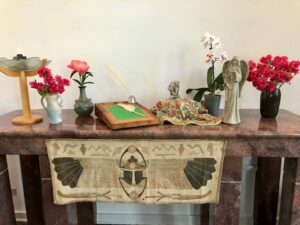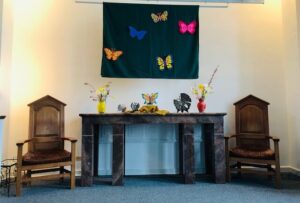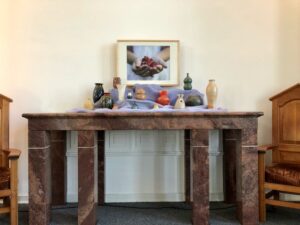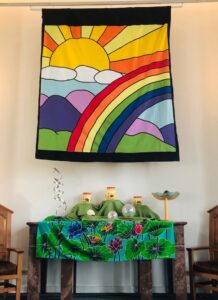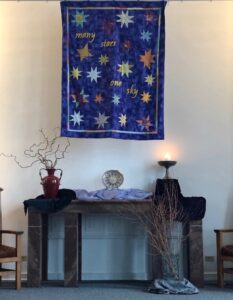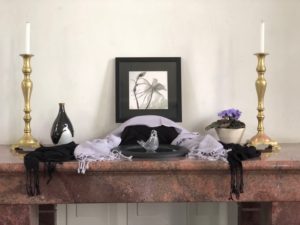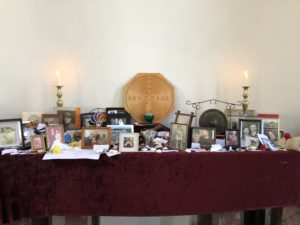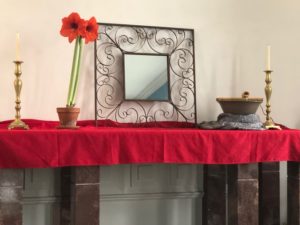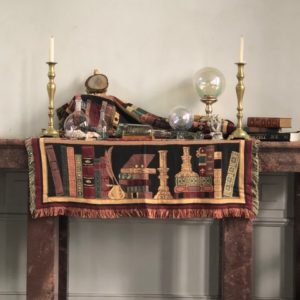August’s Theme:
EMBODIMENT
Text of Rev. Tim Temerson’s Sermon – Living the Shirk Life
Whenever I preach about the importance of rest and of being rather than always doing, I begin with a confession. You see, this is one of those sermons where I’m preaching as much if not more to myself as I am to all of you. Too often, my life can get taken over by the need to cross things off my to-do list and by listening to a voice urging me to “ work harder and to shirk no more.” And, by the way, the voice that is always shouting at me to do more and to rest less is not any of you or the congregation I serve – rather, it’s almost always me, my voice, the voice in my head, telling me to keep going, to push harder, and to put rest at the very bottom of my to-do list.
Most of the things that I think are so urgent that they have to get done right now usually can wait long enough for me to breathe and to rest. But there is one thing that can’t wait and that needs to be addressed right now, today, and every day. And that one thing is the brokenness of our world – a world that feels as if it is moving faster and faster in the wrong direction. There is much that needs to be done and done now. Our climate is getting hotter and many parts of the planet are literally on fire. Democracy and democratic institutions are being undermined and corrupted in this country and across the world. People from marginalized communities and identities are being oppressed, harassed, and denied their rights on a daily basis. How can I, a person of enormous privilege and comfort, stand before you and preach about my need for rest and renewal when so many in our world are hurting and filled with uncertainty and anxiety about the future?
I’m not sure I have a good answer to that question but one thing I do know is that a broken world will never be healed if most people are exhausted and burned out. A few years ago I read an article about the epidemic of exhaustion that pointed out how much the voices of hate and oppression depend on people who are tired and worn down to the point that they become numb to all the hurtful and harmful things going on. I know there are days when I just can’t listen to one more story on the news or think about how harsh and toxic the world is becoming. And this complacency and unwillingness to face reality is most common when I’m over-tired, emotionally drained, and burned out. It is only a rested heart and a nourished soul that can mend a broken world.
So, let’s talk for a minute about rest and I want to begin by simply asking why are so many so tired and so burned out so much of the time? Why do busyness and overwork so often take over our lives?
Much of the answer, I think, stems from the culture, the society, and the economy we live in – a culture that puts a premium on not simply doing and working hard but on always striving to do more. Economic necessity and a crumbling safety net compel many to work two, three, and even four jobs. Think for a moment about how much the pandemic has over-worked and over-taxed health care system and the essential workers who are almost always earning scandalously low wages. Furthermore, our culture celebrates the dedication and work ethic of those who put in 18 hour work days and who work 60, 70, or even more hours during the week. And while advances in technology and communication add convenience to our lives, they can also make it harder to disconnect and decompress – to turn off our cell phones, to not be driven by emails, texts, and social media, and to simply take time for calm and quiet.
In some ways I think we are so driven by the rush to do and do more that we barely notice how little time we take or are given simply for being rather than always doing. Too often our lives are a blur and a race from one job, one task to the next. That is, of course, until we are subjected to so much physical and emotional strain that our physical and mental health suffer and our families and relationships are negatively impacted. And even when we are forced to slow down long enough to heal, we often do so in the name of recharging and recovering sufficient energy to throw ourselves back into an economy of long hours and a race that never ends.
And I think something else happens to us when we are caught in that hamster wheel of doing and more doing. I know when I find myself over-tired, I’m no longer able to really listen, to express as I normally would the love and care I feel for others and the world around me, and to experience those things that bring peace and serenity to my life. Rather than taking time to listen to the birds sing on a beautiful summer morning or slowing down long enough to gaze at a magnificent night sky, I simply keep going and keep doing, barely noticing the simple blessings that make my life meaningful and my spirit whole.
And that’s why it’s so very important to follow a different ethic and a different path – what Richard Gilbert calls the “Shirk Ethic” and what Gary Shockley calls the “meandering way.” I must say I love the word “meandering” and even saying it helps slow me down. Rather than being driven head-long from one task, one goal, one achievement to another, meandering allows us to slow down, to wander, to drift, and simply to be.
Like a slow-moving stream, meandering allows us to follow a path that is winding and indirect – a path that enables us to experience so much of what we miss when we are in the grips of the stress and anxiety of driven-ness. When we follow the meandering way, our lives truly become about the beauty and blessings of the journey rather than about the countless destinations and goals we are so often pursuing.
And when I’m meandering, something wonderful begins to happen to my soul. I become so much more aware, so much more at peace, and so much more grateful for the world around me. I feel, I experience, I embody the beauty and blessing of life. And the word that I think best describes what happens to my spirit when I’m meandering is Sabbath.
Now I know the word Sabbath can conjure up images of long hours spent in a place of worship, listening to someone like me drone on about some arcane theological subject or text. But Sabbath is ultimately not about theology or sermons or sacred texts, and it’s not even about attending a service at a congregation or temple or mosque. Rather sabbath is ultimately about rest and spiritual nourishment. Sabbath is, as writer Wayne Muller defines it, “a way of being in time where we remember who we are, remember what we know, and taste the gifts of eternity and spirit.”
It is this understanding of rest and Sabbath that I want to lift up, not rest as simply a means for recharging so we can do even more and work even harder, but rather rest as a sacred act and a spiritual practice that enables us to appreciate the joys and blessings of life.
I think the Jewish tradition has so much to teach us about the importance of Sabbath in our lives. You may be aware that Shabbat or Shabbos begins at sundown every Friday and ends at sundown on Saturday. Shabbat is a time of rest, of family, of celebration, and of spiritual renewal. It’s not a time to work or to get caught up on a to-do list. That’s why there are rules in the Jewish tradition that forbid work in all its many forms. Shabbat is truly a time to live in a different way and at a different pace.
My absolute favorite description of the meaning and purpose of sabbath comes from the Jewish theologian Abraham Joshua Heschel, who wrote one of the great spiritual classics of all time called “The Sabbath,” which I highly recommend.
Sabbath, Heschel says, is an opportunity to build “a cathedral in time,” an opportunity to live on an “island of stillness,” and an opportunity to be reminded that for all of the hustle and bustle of work and doing, we dwell in a world that is, as he so beautifully puts it, “adjacent to eternity.”
Before closing, I want to say a word about Sabbath and this spiritual community, the Unitarian Universalist Congregation of Charlottesville. More than anything else, when you come through these doors or join us on Zoom, I hope you find Sabbath and rest. In Unitarian Universalism, we often find ourselves busy with many programs, projects, and meetings. And don’t get me wrong. Those programs and projects are wonderful and essential in a religion that is about deeds rather than creeds. But as we engage in the ministry and the work of this beloved community, we must always do that work from a place of rest, from a place of being, and from a place of Sabbath – a place where we are always finding ways to enrich our spirits and to spend time together on islands of stillness.
Friends, as you find yourselves once again in the world of work and doing, give yourselves the gift of sabbath and make time for those islands of stillness and for that taste of eternity. Take time just for being and not always for doing. Even if you are in the middle of an incredibly busy day in which you’re feeling overwhelmed and at your wit’s end, remind yourself to take even the briefest of moments to breathe, to pause, and to meander. For when we give ourselves the gift of rest, we do indeed create a cathedral in time – a place where we can share and experience the beauty, the blessing, and the miracle of being alive and being part of this magnificent creation that is our home.
Blessed Be.
MAKE A PLATE OFFERING
CLICK HERE for our covid safety protocols.
Sharing Joys and Sorrows
If you would like to have a joy or sorrow shared aloud in this week’s community worship service, please complete this form by 9AM Sunday morning.
Find full playlist of past sermons on UUCville Youtube Channel.


